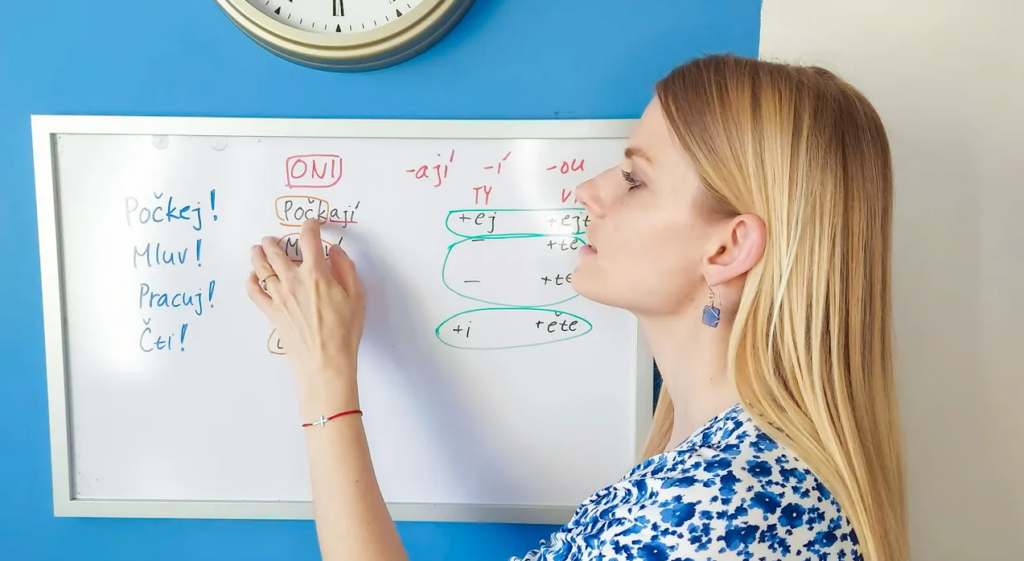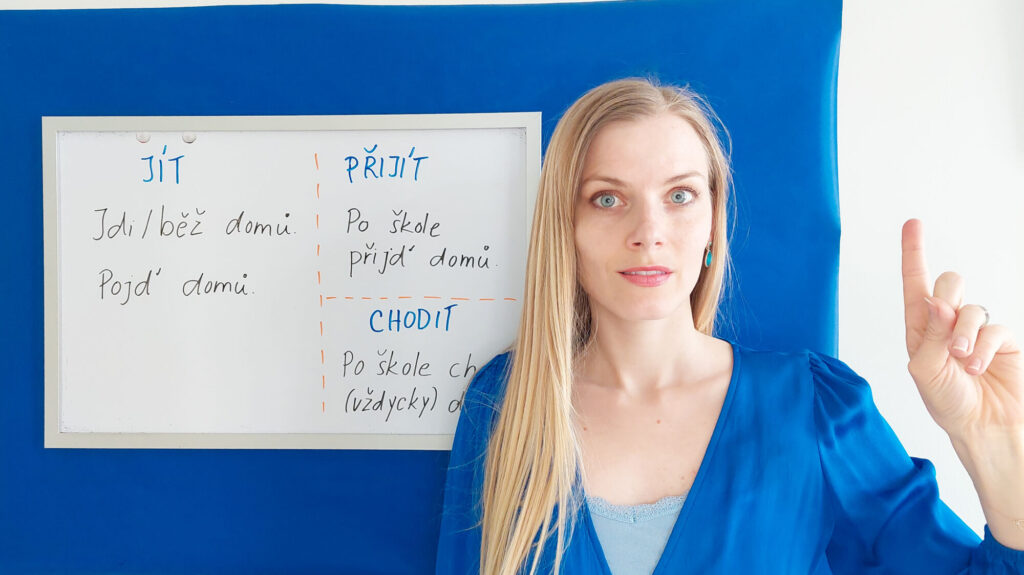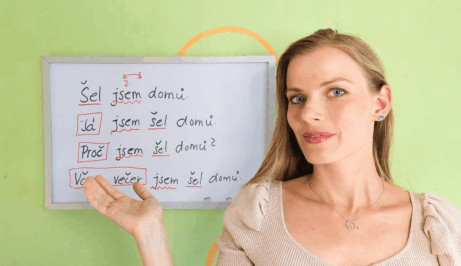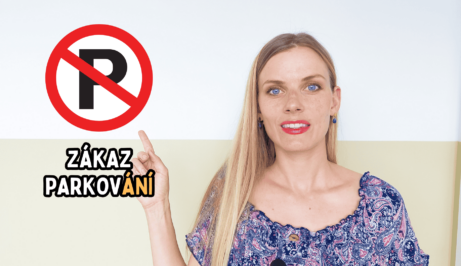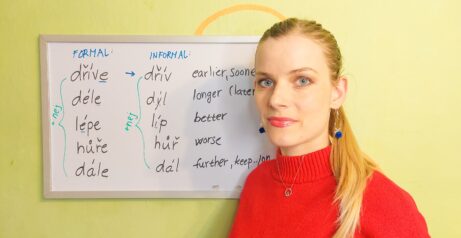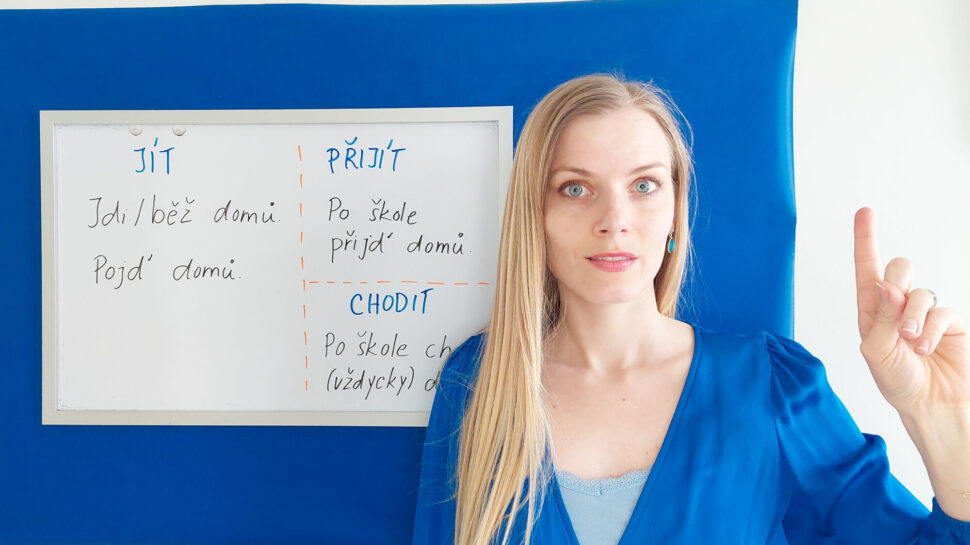
How to Construct the Imperative Form in Czech
Why do we say počkej (wait), but nečekej for don’t wait?
Making imperatives in Czech can be a bit confusing, but don’t worry (neboj se/ nebojte se), there are rules which we can follow. And, there are also irregular verbs which don’t follow those rules. Well, that’s Czech, you’re probably not surprised.
First, let’s have a look at how to make the affirmative infinitive.
If you would prefer to learn with a video, watch it here.
To make the imperative form, we need to master the verb conjugation in the present tense. Particularly, we need to know the third person plural (oni). It is not important to know if the verb is imperfective or perfective.
First, let’s see how to make imperatives with verbs that belong to the first conjugation group (ending with -at). Careful! Verbs with -ovat are a different group!
Počkat (wait) – How to make its imperative form:
- We form the present tense of the third person plural (oni form): počkají.
- Then we take away the ending, which is -ají. We are left with počk-.
- For ty (second person singular) we add -ej: Počkej!
For vy (second person plural) we add -ejte: Počkejte!
For my (first person plural) we add -ejme: Počkejme!- I’m purposely using my as the last verb because this imperative form is not very common.
Follow the steps and do the same for these verbs:
zpívat (sing)
říkat (say/tell)
počítat (count)
podat (pass/hand)
dělat (do/make)
Here are the results:
zpívat: zpívej (ty), zpívejte (vy), zpívejme (my)
říkat: říkej (ty), říkejte (vy), říkejme (my)
počítat: počítej (ty), počítejte (vy), počítejme (my)
podat: podej (ty), podejte (vy), podejme (my)
dělat: dělej (ty), dělejte (vy), dělejme (my)
What happens with other verb groups? That depends on how many consonants are in the stem.
Let’s look at the verb mluvit (speak). The oni form is: Mluví. The ending we remove is -í. We are left with mluv–. We focus on the the last two letters: -uv-. There is only 1 consonant, which means:
For ty we don’t add anything: Mluv!
For vy we add -te: Mluvte!
For my we add -me: Mluvme!
Let’s work with the verb číst (read). The oni form is: Čtou. The ending we remove is -ou. We are left with čt–. We focus on the the last two letters: -čt-. This time, there are 2 consonants, which means:
For ty we add -i: Čti!
For vy we add -ěte: Čtěte!
For my we add -ěme: Čtěme!
And that’s it! At this point, it might look to you like doing random magic. Let me state the rules:
The possible endings which we take away are: -ají, -í, -ou (nothing else)
If the verb belongs to the -at group, we add: -ej (ty), -ejte (vy), -ejme (my)
For any other group:
If the last two letters of the verb stem contain 1 consonant, we add: – (ty), -te (vy), -me (my)
If the last two letters of the verb stem contain 2 consonants, we add: -i (ty), -ěte/-ete (vy), -ěme/eme (my)
-ěte/-ěme comes after consonants d, t, n, p, b, p, v, m, -ete/-eme after the rest of the consonants
Let’s make more imperatives of regular verbs:
sportovat (do sport): sportuj, sportujte
myslet (think): mysli, myslete
podívat se (look): podívej se, podívejte se
hledat (look for): hledej, hledejte
poslouchat (listen): poslouchej, poslouchejte
spát (sleep): spi, spěte
opakovat (repeat, review): opakuj, opakujte
vítat (welcome): vítej, vítejte
pít (drink): pij, pijte
psát (write): piš, pište
kouknout se (take a look): koukni se, koukněte se
These verbs have some irregularities:
zaplatit (pay): zaplať, zaplaťte
řídit (drive): řiď, řiďte
vrátit se (go/come back): vrať se, vraťte se
jít (go): jdi, jděte (also a more informal version: běž, běžte) or pojď, pojďte
The verb to go in the imperative form is a chapter of its own. You can learn more about it in this video.
Now it’s time for the irregular verbs. Ready?
být (be): buď, buďte
jíst (eat): jez, jezte
mít (have): měj, mějte
stát (stand): stůj, stůjte
koupit (buy): kup, kupte
přijít (come): přijď, přijďte
This verb refers to the future. Once again, you can learn more about it in this video.
This information might beoverwhelming but you know that practice makes perfect. Although I am a native speaker and I know the forms of the imperative, I also had to learn how to form them! How? By teaching! Train your brain too by making more imperatives. Here is a task for you.
Form more imperatives yourself. You will find solutions below.
dát (give, put): (ty, vy)
používat (use):
dívat se (look at/watch):
pamatovat si (remember):
doufat (hope):
zavřít (close):
vzít (take – this is group 4: Já vezmu):
malovat (paint):
….
SOLUTIONS:
dát (give, put): (ty) dej, (vy) dejte
používat (use): používej, používejte
dívat se (look at/watch): dívej se, dívejte se
pamatovat si (remember): pamatuj si, pamatujte si
doufat (hope): doufej, doufejte
zavřít (close): zavři, zavřete (not zavřěte, too many “háčeks”)
vzít (take): vezmi, vezměte
malovat (paint): maluj, malujte
Another way is to learn the common imperatives which you can hear around you very often.
Here is a list of common imperatives:
Dělej! / Dělejte! – Come on!
Počkej! – Wait!
Povídej! – Tell (me)!
Podívej (se)! – Look!
Koukni/Koukej! – Look (more colloquial)!
Měj se hezky! – Have a good time/day!
Zapomeň na to! – Forget about it!
Dej mi to! – Give it to me!
Vrať mi to! – Give it back to me!
Otevři dveře. – Open the door.
Zavři oči. – Close your eyes.
Stůj! – Stop (for a person in motion), stand!
Přestaň! – Stop (it)!
Zastav! – Stop! (e.g. the car and other vehicles)
Běž/Jdi pryč! – Go away!
Pojď sem! – Come here!
Do you think you should brush up on your conjugation of verbs? You can download a list of common verbs and their conjugation here:
Imperfective verbs.
Perfective verbs.

